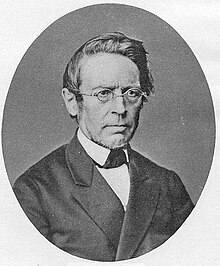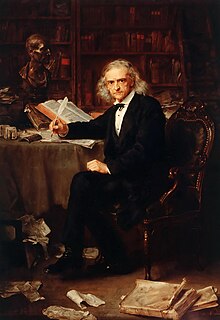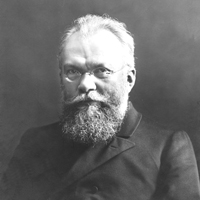History of historical science
The history of historical science is part of the history of science . A history has been around since the ancient times (see also: History of historiography ), a systematic science of history , however, is only the 19th century set.
introduction
There is a long and varied tradition of historiography in different cultures. These works were mostly of a practical nature (e.g. annotated lists of rulers, astronomical calendars) or were written and received as a genre of literature. In the course of the history of historiography , individual authors developed approaches to a scientific, methodical penetration of the subject matter, which later historians also resorted to. A systematic, generally recognized scientific methodology did not emerge until the beginning of the 19th century. This development did not proceed uniformly, so the foundation of source criticism for classical studies was already laid in the Renaissance. In the 19th century, Wilhelm Wachsmuth and Johann Gustav Droysen developed the first basic methodological instructions for studying history, known as history . The process of institutionalizing history as an academic subject can also be found in the 19th century. Initially a sub-discipline of other sciences such as law, “history” established itself as an independent discipline.
19th century
Main characteristic of historiography
History as a scientific discipline begins to establish itself with the Prussian reforms in 1810 under Wilhelm von Humboldt for the introduction of such scientific-systematic categories. The scientific concept is also called historicism . Barthold Georg Niebuhr implemented this scientific concept for the first time in his Roman history from 1812. This is unmistakably connected to the reorganization of the Prussian state with an anti-Napoleonic objective. A little later, Leopold von Ranke developed a source-critical method for historiography, which combines the narrative method from the Age of Enlightenment with the new source-critical method, which bases history on the traditional sources. The latter, however, has primacy.
The historical science has no literary task itself, but also a good scientific prose can be found in widely recognized. In 1902 Theodor Mommsen even received the Nobel Prize for Literature for his Roman history .
For a long time, historiography was essentially the history of people and states. “Men make history”, as Heinrich von Treitschke once said. Cultural history, or social and economic history, is viewed as secondary in contemporary German history, apart from Johannes Janssen , who emphasizes the social consequences of the Reformation . However, denominational particularities come into play here.
At the end of the 19th century there was also a dispute over methods with Karl Lamprecht , for whom people and states were secondary, while the cultural and social-historical processes were the primary. The extent to which Lamprecht's views shake the foundations of previous historical accounts can be seen in the reactions of his opponents, who accuse him of positivism and materialism . That is also because a volume of his German history was positively reviewed by the social democratic historian Franz Mehring .
The most determined opponents of Lamprecht include Georg von Below , Felix Rachfahl , Heinrich Rickert and Max Lenz . The disputes were often characterized by open hostility, in which the actual discussion took a back seat. Individual debates such as those between Dietrich Schäfer and Eberhard Gothein , which took place before, did not achieve this fundamental sharpness. Basically, science, which has a generic method, challenged the descriptive method as used in historical studies. In this context, Luise Schorn-Schütte speaks of the "crisis of historical science".
However, this does not mean that there was no economic or social history in Germany. The historical school of economics with scholars like Gustav von Schmoller had existed since around 1850 . She also dealt specifically with social issues and sought practical science for solving the problems of the time.
The previous method of writing history did not take into account the new social requirements of industrialization . Lamprecht looked for appropriate methodological alternatives . Under the influence of the psychologist Wilhelm Wundt and his national psychology , he wanted to make the cultural age dependent on the psychological nature of the people. From this he developed his theory of psychogenesis . Even if the state of the people's soul is generally taken into account, Lamprecht's approach to universal historiography is generally rejected.
An analogous process can be observed in the other states of Western Europe and in the United States of America. Here, too, national history was first written. For France, for example, the names Alexis de Tocqueville , Adolphe Thiers and Jules Michelet should be mentioned, for England Thomas Babbington Macaulay . In contrast to German history, however, Karl Lamprecht's methodological approach was received more positively because his view of history takes the development of social conditions into account more than is otherwise the case in German history. Answers to such questions were increasingly sought in the West. It is no coincidence that a particularly large number of foreign students studied with Lamprecht in Leipzig. The philosophical conception of positivism ( Auguste Comte , Henry Thomas Buckle ), which was largely rejected in German historiography, with the exception of Karl Lamprecht, had a much stronger effect in Western historiography .
Institutions

Overall, a change is taking place at universities too, where history has been taught within the framework of philosophy and law, towards the development of an independent academic discipline. This concerns on the one hand the development of institutional structures as well as the professionalization process itself, which is expressed in the development of the training of specialist historians and teachers. In Germany this process of institutionalization took place as early as the first half of the 19th century, in the USA and France as early as the second half of the 19th century. In Great Britain, on the other hand, this did not happen until shortly before the beginning of the 20th century.
In addition to the expansion of the university chairs, other institutions were founded, for example the Monumenta Germaniae Historica (1819) or the Commission for the History of Parliamentarism and Political Parties (1951).
20th century
At the beginning of the twentieth century there was an increased focus on cultural, economic and social history, without neglecting political history. This happens under the decisive influence of Karl Lamprecht and the founder of sociology Max Weber . First of all, for the further development, one must say that social history initially deals primarily with the structures of society. Based on this, a historical social science emerges. This means a stronger connection between history and sociology. The latter basic discipline is significantly upgraded.
Werner Conze , Jürgen Kocka , Wolfgang Köllmann , Reinhart Koselleck , Thomas Nipperdey and Hans-Ulrich Wehler are among the most important German representatives of social history after 1945 . Furthermore, the Annales school of French historical studies must be mentioned here , which represents a current that tries to integrate methods from neighboring disciplines such as sociology or geography into the consideration of history. Its most important representatives are Lucien Febvre , Marc Bloch , Fernand Braudel , Philippe Ariès and Jacques Le Goff , all of whom were closely associated with the later École des hautes études en sciences sociales (EHESS) in Paris . In Marxist literature, such as Jürgen Kuczynski , the social and economic-historical aspect is particularly emphasized anyway, because the question of the relations of production is of extraordinary importance. Later, in the 1980s, there was a clear shift in emphasis towards everyday history .
American social history research began in the early 1980s to “create” oral sources on individual aspects of recent everyday history by letting contemporary witnesses speak without being influenced and transcribing the tape recordings (“ oral history ”).
Also in the 1980s there was the so-called “paradigm breakdown” (German paradigm shift ) or the “ linguistic turn ” in the social sciences . Under the influence of postmodernism or poststructuralism , the claim to discover historical truths “behind” language and discourse was abandoned. Instead, they turned to discourse itself as an expression of social meaning. Michel Foucault and the history theorist Hayden White can be seen as pioneers of this approach . As a result, a multitude of new questions and methods emerged. B. New cultural history , historical anthropology and microhistory as well as women's history and gender research in the context of gender studies .
The areas of ancient history , medieval studies and the history of the early modern period also remained important fields of activity in historical studies, with a broad public interest in the history of the Middle Ages (albeit often distorted by popular ideas). As a new field of research in the Middle Ages customer since the created sixties that people research the "Freiburg School", starting from Gerd Tellenbach mainly by Karl Schmid and Joachim Wollasch who are primarily concerned with the hitherto sorely neglected source genus of Memorial tradition is concerned.
From the 1990s onwards, instead of world history , people began to speak more and more of global history or global history, with the aim of overcoming the nation-state habitus inherent in world historiography through a changed perspective. This goal is also pursued by transnational history or the Histoire croisée or entangled history .
On the history of ethnicity research and National Socialism :
Regarding individual debates in historical studies :
See also
- Everyday story
- Women's story
- Historical image
- Philosophy of history
- Historiography
- Church history
- Social history
- Theory of history
- World history
- National history
literature
- Horst Walter Blanke: Historiography history as history . Stuttgart 1991.
- Roger Chickering : Karl Lamprecht. A German Academic Life . Atlantic Highlands (New Jersey) 1993.
- Sebastian Conrad : In search of the lost nation. Historiography in West Germany and Japan 1945–1960 . Göttingen 1999.
- Christoph Conrad, Sebastian Conrad (Hrsg.): Writing the nation. History in international comparison . Göttingen 2002 ( digitized version ).
- Andreas W. Daum , Hartmut Lehmann, James J. Sheehan (eds.): The Second Generation. Émigrés from Nazi Germany as Historians . Berghahn Books, New York 2016, ISBN 978-1-78238-985-9 .
- Johann Gustav Droysen : Outline of the history . Leipzig 1868.
- Heinz Duchhardt , Gerhard May (ed.): History around 1950 . Mainz 2002.
- Jan Eckel , Thomas Etzemüller (ed.): New approaches to the history of historical science . Göttingen 2007.
- Alexander Fischer, Günther Heydemann (Ed.): History in the GDR . 2 volumes. Berlin 1988/90.
- Eduard Fueter : History of the recent historiography. 3. Edition. Zurich 1985.
- Ewald Grothe : Between History and Law. German constitutional historiography 1900–1970. Munich 2005.
- Günter Johannes Henz: Leopold von Ranke in historical thinking and research . 2 volumes. Berlin 2014.
- Günther Heydemann: History in divided Germany. Development history, organizational structure, functions, theory and method problems in the Federal Republic of Germany and the GDR . Frankfurt am Main 1980.
- Bettina Hitzer, Thomas Welskopp (ed.): The Bielefelder social history. Classical texts on a historical program and its controversies . Bielefeld 2010.
- Georg G. Iggers : German History. A critique of the traditional view of history from Herder to the present . 3. Edition. Cologne / Weimar / Vienna 1997.
- Georg G. Iggers: History of the 20th Century. A critical overview in an international context . Göttingen 2007 ( digitized version ).
- Friedrich Jaeger, Jörn Rüsen : History of Historicism . Munich 1992.
- Tobias Kaiser, Steffen Kaudelka, Matthias Steinbach (eds.): Historical thinking and social change. Studies in historical studies between the German Empire and the German two-state system . Berlin 2004.
- Ilko-Sascha Kowalczuk (Hrsg.): Paradigms of German History. Lecture series at the Humboldt University in Berlin . Berlin 1994.
- Ilko-Sascha Kowalczuk: Legitimation of a new state. Party workers on the historical front. History in the Soviet Zone / GDR 1945 to 1961. Ch. Links, Berlin 1997.
- Gabriele Lingelbach : Klio is making a career. The institutionalization of history in France and the USA in the second half of the 19th century . Göttingen 2002 ( digitized version ).
- Otto Gerhard Oexle : History under the sign of historicism. Studies on problem stories of the modern age . Göttingen 1996 ( digitized version ).
- Ulrich Pfeil (Ed.): The German Historical Institute Paris and its founding fathers. A personal history approach . Munich 2007.
- Ulrich Pfeil (Ed.): The return of German historical science to the “ecumenism of historians”. A science-historical approach . Munich 2008 ( digitized version ).
- Karl Heinrich Pohl (ed.): Historians in the GDR . Göttingen 1997 ( digitized version ).
- Lutz Raphael : The heirs of Bloch and Febvre. Annales historiography and nouvelle histoire in France 1945–1980 . Stuttgart 1994.
- Lutz Raphael: History in the Age of Extremes. Theories, methods, tendencies from 1900 to the present . Munich 2003.
- Pietro Rossi (ed.): Theory of modern historiography . Frankfurt am Main 1987.
- Hans Schleier : History of German cultural historiography . Volume 1: From the end of the 18th to the end of the 19th century . Waltrop 2003.
- Hans Schleier (Ed.): Karl Lamprecht. Alternative to tendril . Leipzig 1988.
- Luise Schorn-Schütte : Karl Lamprecht. Cultural historiography between science and politics . Goettingen 1994.
- Peter Schöttler (Ed.): Historiography as a science of legitimation 1918–1945 . Frankfurt am Main 1997.
- Peter Schöttler: The “Annales” historians and German history. Tübingen 2015.
- Ernst Schulin (ed.): German history after the Second World War 1945-1965 . Munich 1989.
- Winfried Schulze : German history after 1945 . Munich 1989.
- Winfried Schulze, Otto Gerhard Oexle (ed.): German historians in National Socialism . Frankfurt am Main 1999.
- Hans-Ulrich Wehler : Historical social science and historiography. Studies on the tasks and traditions of German history . Göttingen 1980.





